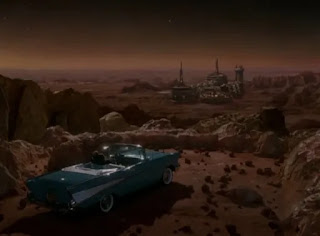Title:
The SculptorWriter and Artist: Scott McCloud
Struggling professional sculptor David Smith makes a deal with Death. Over the next 200 days, his hands will create - as if by magic - anything his creative mind can conjure. However, at the end of 200 days, he will die. To complicate matters further, soon after, he falls in love.
I first became aware of Scott McCloud through his extraordinary non-fiction work. His books
Understanding Comics,
Reinventing Comics and
Making Comics offer a fascinating behind-the-scenes tour of the sequential arts medium. They were an essential part of my own orientation to the comic book world. The books themselves also reveal a great deal about their creator. McCloud is as fascinated by the artistic process as he is by the product.
The Sculptor reflects this, too, though rather than focusing on the technical aspects - especially since with his new "powers," David instantly creates whatever he wants by simply touching the material - the story follows the artist's emotional journey. The narrative itself, particularly the love story, is engrossing. But the deeper explorations of inspiration, motivation and the relationships between creator, consumer and critic are the more interesting drivers.
A few years ago, I had a memorable conversation with an art teacher colleague about the role of "the audience" in creating art. I asserted, naïvely as it turns out, that one should always consider the perspective of the consumer in the creation of a piece. She furrowed her brow at me and responded, "No. Some of the most important work you'll ever do as an artist is what you create for yourself - only for yourself."
I can say from decades of experience that musicians, like me, hardly ever see things that way. Our training is built entirely around what we project to the listener. Yes, we should internalize the work as much as we can so we embody it. But still, that is for the sake of the performance. Until that conversation, I took for granted that everyone in the arts felt the same way.
While The Sculptor doesn't explore this matter explicitly, much of David's journey revolves around reconciling what is meaningful to him with what is meaningful to the consumer. He is, after all, trying to make a living so finding buyers is important. But as the literal deadline approaches, the financial motivations fall away. It's the legacy that matters. How will he be remembered? Eventually, even that becomes less important than the honesty of his work.
My own visual art talents don't extend very far past stick figures. I envy anyone who can convert a mental vision into a concrete reality. McCloud's talents are considerable. He's a master of black-and-white, bringing rich depth and texture to his drawings. The Sculptor was published in 2015 and I haven't seen anything new from him since. His work is so detailed that I'm not surprised he doesn't crank out books more quickly. Still, I hope we see more from him before too long.
















